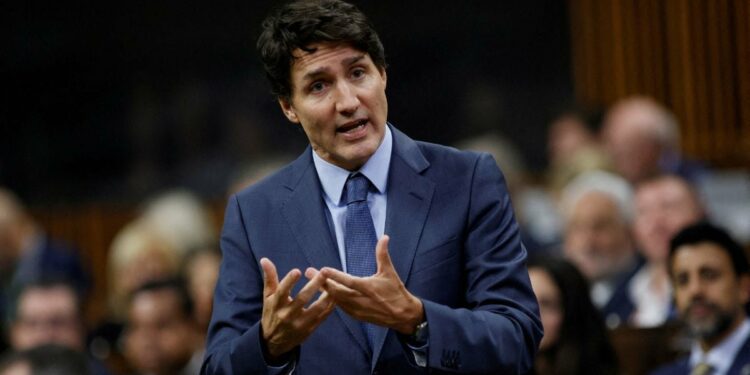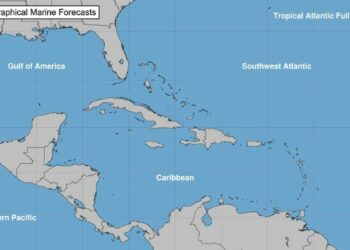Canadian Prime Minister Justin Trudeau is floundering in a sea of political turmoil, and in his desperate bid for survival, he is dragging Canada’s image down with him. In a reckless manoeuvre, he is sidelining the country’s longstanding relationship with India, seemingly oblivious to the consequences. Even if diplomatic ties manage to resurface, the trust that once underpinned this vital partnership is now irreparably damaged, likely taking years to mend. Trudeau’s penchant for opportunistic politics, coupled with his troubling affection for Khalistani separatists, has brewed a toxic mix—one he seems all too eager to consume for personal gain.
The diplomatic rift between India and Canada has escalated significantly following the death of Khalistani terrorist Hardeep Singh Nijjar. On Monday, India took decisive action by expelling six Canadian diplomats. This move followed India’s decision to recall its high commissioner and several other officials from Canada. The decision was prompted by Canada’s claim that Indian High Commissioner Sanjay Kumar Verma, along with other diplomats, were considered “persons of interest” in the investigation into Nijjar’s murder. The Ministry of External Affairs expressed its strong discontent by summoning the Canadian Charge d’Affaires, insisting that the targeting of Indian officials was “entirely unacceptable.”
Canadian Prime Minister Justin Trudeau responded by citing the Royal Canadian Mounted Police Commissioner, Mike Duheme, who claimed that there is clear evidence of Indian government agents posing a significant threat to public safety. Trudeau stated that Canada would not tolerate any foreign government threatening or killing its citizens, calling it an unacceptable violation of Canadian sovereignty and international law. He reaffirmed Canada’s commitment to upholding the rule of law and democratic principles.
Trudeau also noted that since last summer, Canada has been collaborating closely with its Five Eyes partners, especially the United States, which has faced similar issues with India related to attempted extrajudicial killings. He made these remarks during a press conference in Ottawa.
Prime Minister Trudeau further remarked, “Canada fully respects the sovereignty and territorial integrity of India, and we expect India to do the same for us.” But how does that respect manifest? By supporting a movement that directly undermines India’s sovereignty, aiming to carve out a separate nation—Khalistan—from its own territory.
Trudeau ironically opens all ‘Five Eyes’
In an effort to rally support from the other members of the Five Eyes alliance, Prime Minister Justin Trudeau aired all his grievances about India. However, rather than receiving the sympathy he sought, Trudeau inadvertently exposed how Canada is actively aiding a separatist movement with strong links to Pakistan-based terror organisations, many of which are already listed as terrorist groups by both the US and the UK. ‘
So much for the wisdom of Prime Minister Trudeau!
The Five Eyes is an intelligence alliance composed of five countries: Australia, Canada, New Zealand, the United Kingdom and the United States. Formalised post-war with the 1946 (United Kingdom – United States of America) UKUSA Agreement after the World War II, the primary objective of the Five Eyes is to enhance cooperation in intelligence collection, analysis and dissemination. The alliance enables its members to monitor and report on global threats, including terrorism, cybercrime, and various security challenges. The Five Eyes play a crucial role in counterterrorism efforts, sharing actionable intelligence to prevent attacks and disrupt terrorist networks.
But what should the other four eyes do when the fifth one is itself a self-acknowledged sponsor of terror?
‘Vienna Convention’
Prime Minister Trudeau seems to have a particular affinity for the Vienna Convention. Just eleven months ago, he expressed his disappointment, claiming “we were so disappointed when India violated the Vienna Convention” after India expelled over 40 Canadian diplomats during the diplomatic fallout between the two nations.
If Trudeau believes he can lecture others on the Vienna Convention, he should take the time to understand its finer points. Article 29 of the 1961 Vienna Convention on Diplomatic Relations clearly states that the person of a diplomatic agent is inviolable and cannot be subjected to arrest or detention. It also specifies that the receiving state must treat the diplomatic agent with due respect and take all necessary measures to prevent any attack on their person, freedom, or dignity.
By this definition, how can Canada, without any basis, label the Indian High Commissioner and other diplomats as “persons of interest” in a homicide investigation? There is no truth to such accusations, and Canada’s stance is not just baseless but outrageous.
Instead of invoking the Vienna Convention, Trudeau should focus on United Nations Security Council Resolution 1373 (2001), which requires member states to combat terrorism by criminalising its financing and improving international cooperation. Right now, Canada is acting as a facilitator of terrorism. Technically, under this context, it is Canada that is playing the role of the criminal State.
Terror partners of Khalistanis
By bringing the diplomatic spat with India to the attention of the Five Eyes alliance, Prime Minister Trudeau may have unintentionally done India a favour. A 2021 Hudson Institute study revealed that Pakistan’s intelligence agency, the Inter-Services Intelligence (ISI), has likely been providing both financial and logistical support to pro-Khalistan groups. For decades, Pakistan has actively promoted the Khalistan movement, both within India and across the Sikh diaspora, aiding insurgencies in Punjab and fuelling anti-India propaganda globally.
This isn’t new—Pakistan’s long-standing ties to terrorism have been condemned by the US and much of the international community. In his 2016 book Pakistan’s Inter-Services Intelligence Directorate: Covert Action and Internal Operations, author Owen Sirrs delves into the ISI’s involvement in supporting the Khalistan insurgency, shedding light on how the Pakistani military and intelligence apparatus have employed such tactics as part of a broader strategy of destabilising India through unconventional warfare.
Sirrs explained that General Zia-ul-Haq viewed the Khalistan movement as a strategic opportunity to weaken India by entangling it in another insurgency, which he referred to as a “war of a thousand cuts.” Hamid Gul, who would later become the Director General of Pakistan’s ISI, reportedly supported this approach, suggesting that destabilising Punjab was akin to the Pakistan Army gaining an additional division without imposing any financial burden on taxpayers.
By highlighting the Khalistan issue to the Five Eyes, Trudeau has exposed Canada’s role in harbouring a movement with dangerous connections, inadvertently shining a spotlight on Pakistan’s hand in this conflict.
For years, certain segments of the Sikh diaspora in North America have openly backed the idea of a separate Sikh homeland, Khalistan. Though the concept of a Sikh state dates back to pre-Partition India in 1947, the push for it took a violent turn only in the late 1970s, with militant activity persisting through the early 1990s. The Khalistani insurgency in Punjab peaked between the mid-1980s and mid-1990s but eventually lost momentum, leading to a long period of dormancy. However, in recent years, there has been a resurgence of support for the movement, particularly among diaspora groups. This renewed push has made it all the more crucial for efforts to suppress these foreign-based Khalistani initiatives to be expedited before they regain further traction.
Is the US turning a blind eye?
A report by the Hudson Institute revealed that while the US was initially hesitant to acknowledge Pakistan’s role in supporting Khalistan terrorists, it did so after the Soviet withdrawal from Afghanistan and the cessation of US aid to Afghan mujahideen. The US Department of State’s Patterns of Global Terrorism report explicitly references both Khalistani terrorism and Pakistan’s involvement. This is something Prime Minister Trudeau should note, as supporting or aiding those linked to terrorism, even indirectly, makes one equally culpable.
Despite this, Pakistan’s covert backing has allowed Sikhs in countries like the United Kingdom, the US and Canada to stoke pro-Khalistan sentiment without much pushback from these governments, even in the face of India’s repeated concerns. In fact, the alignment between Khalistani and Kashmiri separatist groups has become more noticeable in North America, the UK and Europe, with these activists often operating in collaboration.
The media has frequently reported connections between Khalistani factions and Pakistan-based terror outfits like Lashkar-e-Taiba and Jaish-e-Mohammed. Yet, Trudeau seems oblivious to such alarming ties.
No quick fix
As long as Prime Minister Trudeau stays in power and Canada remains enamoured with the Khalistan movement, any hope for a reset in diplomatic relations with India appears remote.
Source link : http://www.bing.com/news/apiclick.aspx?ref=FexRss&aid=&tid=670e4b048214447faceade8c9c637c92&url=https%3A%2F%2Fwww.firstpost.com%2Fworld%2Fjustin-trudeaus-reckless-bet-on-khalistani-separatists-undermines-canadas-global-standing-13825525.html&c=7257449477516712116&mkt=en-us
Author :
Publish date : 2024-10-14 22:32:00
Copyright for syndicated content belongs to the linked Source.







